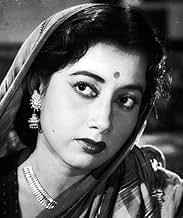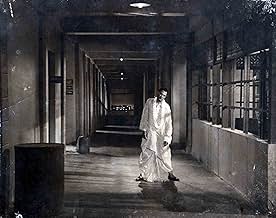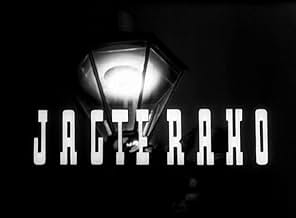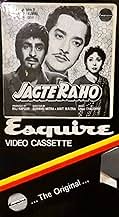Jagte Raho
- 1956
- 2h 33min
CALIFICACIÓN DE IMDb
8.1/10
1.1 k
TU CALIFICACIÓN
Agrega una trama en tu idiomaAn innocent guy who has arrived from a village to Kolkata gets himself involved into trouble in search of water after he gets thirsty in the middle of the night.An innocent guy who has arrived from a village to Kolkata gets himself involved into trouble in search of water after he gets thirsty in the middle of the night.An innocent guy who has arrived from a village to Kolkata gets himself involved into trouble in search of water after he gets thirsty in the middle of the night.
- Dirección
- Guionistas
- Elenco
- Premios
- 1 premio ganado y 1 nominación en total
Pahadi Sanyal
- Shashan - Meenu's husband
- (as Pahari Sanyal)
Sulochana Chatterjee
- Meenu
- (as Sulochana Chaterjee)
Iftekhar
- Chandu (Leader)
- (as Iftikhar)
Moni Chatterjee
- Baral Babu
- (as Moni Chaterjee)
Opiniones destacadas
What worked:
- screenplay is relevant and fresh, and can be analyzed in any generation. The movie theme is powerful, engaging and brutal. The lead actor has shown grace and depth to the character which makes it a believable narrative. The story is unique and powerful storytelling makes it a wonderful watch.
- glorified scenes and setting; maybe many scenes of the movie are superficial and feels like an unreal setting. The chase and run scenes feel repetitive and less creative. However, the final result of the movie is a powerful watch.
"Jagte Raho," a cinematic gem from 1956, is a profound social commentary wrapped in the guise of a gripping drama. Directed by Amit Maitra and Sombhu Mitra, and written by the legendary K. A. Abbas, the film stars Raj Kapoor in a role that is as endearing as it is significant.
The narrative follows the plight of a simple villager, portrayed with remarkable nuance by Kapoor, who ventures into the city with hopes of a better life. His quest for a mere sip of water lands him in an apartment complex, where he is mistaken for a thief. This misunderstanding sets off a chain of events that exposes the hypocrisy and corruption of the urban middle class.
"Jagte Raho" is a film that transcends time, with themes as relevant today as they were in the 1950s. The performances are stellar, with Kapoor leading a cast that includes the talented Nargis in a memorable cameo. The direction is masterful, weaving a narrative that is both intimate and expansive.
The music, composed by Salil Choudhury, with lyrics by Shailendra and Prem Dhawan, is another highlight. The songs, including the iconic "Zindagi Khawab Hai," performed by Mukesh, add a lyrical depth to the film's poignant storytelling.
The film's climax is particularly striking, offering a resolution that is both hopeful and heartrending. "Jagte Raho" won the Crystal Globe Grand Prix at the Karlovy Vary International Film Festival, a testament to its universal appeal and enduring legacy1.
In summary, "Jagte Raho" is not just a film; it's a powerful exploration of human nature and societal flaws. It's a must-watch for anyone who appreciates cinema that challenges, entertains, and enlightens.
The narrative follows the plight of a simple villager, portrayed with remarkable nuance by Kapoor, who ventures into the city with hopes of a better life. His quest for a mere sip of water lands him in an apartment complex, where he is mistaken for a thief. This misunderstanding sets off a chain of events that exposes the hypocrisy and corruption of the urban middle class.
"Jagte Raho" is a film that transcends time, with themes as relevant today as they were in the 1950s. The performances are stellar, with Kapoor leading a cast that includes the talented Nargis in a memorable cameo. The direction is masterful, weaving a narrative that is both intimate and expansive.
The music, composed by Salil Choudhury, with lyrics by Shailendra and Prem Dhawan, is another highlight. The songs, including the iconic "Zindagi Khawab Hai," performed by Mukesh, add a lyrical depth to the film's poignant storytelling.
The film's climax is particularly striking, offering a resolution that is both hopeful and heartrending. "Jagte Raho" won the Crystal Globe Grand Prix at the Karlovy Vary International Film Festival, a testament to its universal appeal and enduring legacy1.
In summary, "Jagte Raho" is not just a film; it's a powerful exploration of human nature and societal flaws. It's a must-watch for anyone who appreciates cinema that challenges, entertains, and enlightens.
The film "Jaagte Raho" starts with Raj Kapoor, a poor person looking to quench his thirst. Thirsty, he enters an apartment building where he is branded as a thief and is constantly on the run. Ironically, where ever he hides, he meets other so called "reputable" citizens who all are equal to thieves. The film captures the corruption rampant in the society and rips apart the moral fabric that shields the upper echelons of society. The protagonist isn't a criminal, but he is treated like one, which is quite comparable to the real world. The film exposes a range of vices while at the same time remaining funny. The theme which the film showcases could have happened anywhere. The protagonist is the generic poor man to whom society has bestowed little. Raj Kapoor gave a fine performance as the peasant, even though he hardly has a few dialogues in the film, but his face speaks for itself. The film is brilliantly done. The supporting cast of Motilal and Pradeep are also good. The film is both a comedy and a tragedy. It makes you laugh and then makes you cry at the pitiable state of society.
Jagte Raho is one of the most amazing classics of Indian cinema. It is sad, comic, tragic, humorous, authentic, educative and entertaining. This magnificent social dramedy relates the story of one poor and innocent peasant who comes to the big city of Bombay in hopes of improving his life. However, while looking for some water to quench his thirst, he is constantly branded a thief by the citizens of the city and chased like a criminal. Looking for a hideout, still thirsty and hungry, he enters an apartment building, running from one flat to another, and ironically, every flat he hides in, he meets different "elite" citizens, all of whom can be easily called thieves.
The film shows the double standards of our society, the cruelty and the corruptness, but not in a stereotypical way. It is natural and real. This naive peasant represents the simple common man who becomes a victim for no fault of his own, not only in India but in the entire world. He encounters different sorts of thefts and crimes committed by those so-called "respectable" citizens of the city, those who call him a thief and chase him just because he yearns for a few drops of water so that they can hide their own misdemeanors. This is so unbelievable yet so true.
Raj Kapoor is the film's main protagonist and may I say, this is one of the finest works of his career, both as a filmmaker and particularly as an actor. The fear in his eyes is so haunting. You really feel for him as you witness his pain, his thirst, his misery, his innocence and his helplessness. The film's final scenes are absolutely fantastic. Kapoor's outburst on the roof of the building in front of the entire nation as he reproaches them for their inhumanity is well-done.
The next two scenes are the film's final and finest. The first, when he gets onto the porch of another flat where he meets the cute-as-a-button Daisy Irani is heart-breaking. Irani's five-minute role of a kind-hearted, joyful and fearless little girl (which is contrary to the rest of the building's residents) who motivates the peasant to exit the building and face the people, is very memorable. There starts the film's best song, "Jago Mohan Pyaare" and we meet a young woman played by Nargis. The graciousness in her eyes and the brief, wordless interaction between Kapoor and Nargis create a magical, unforgettable scene which brings to a beautiful ending. See the film to understand how beautiful it is. This truly is an extraordinary picture.
The film shows the double standards of our society, the cruelty and the corruptness, but not in a stereotypical way. It is natural and real. This naive peasant represents the simple common man who becomes a victim for no fault of his own, not only in India but in the entire world. He encounters different sorts of thefts and crimes committed by those so-called "respectable" citizens of the city, those who call him a thief and chase him just because he yearns for a few drops of water so that they can hide their own misdemeanors. This is so unbelievable yet so true.
Raj Kapoor is the film's main protagonist and may I say, this is one of the finest works of his career, both as a filmmaker and particularly as an actor. The fear in his eyes is so haunting. You really feel for him as you witness his pain, his thirst, his misery, his innocence and his helplessness. The film's final scenes are absolutely fantastic. Kapoor's outburst on the roof of the building in front of the entire nation as he reproaches them for their inhumanity is well-done.
The next two scenes are the film's final and finest. The first, when he gets onto the porch of another flat where he meets the cute-as-a-button Daisy Irani is heart-breaking. Irani's five-minute role of a kind-hearted, joyful and fearless little girl (which is contrary to the rest of the building's residents) who motivates the peasant to exit the building and face the people, is very memorable. There starts the film's best song, "Jago Mohan Pyaare" and we meet a young woman played by Nargis. The graciousness in her eyes and the brief, wordless interaction between Kapoor and Nargis create a magical, unforgettable scene which brings to a beautiful ending. See the film to understand how beautiful it is. This truly is an extraordinary picture.
Jagtey Raho is filmmaking and story telling at its best. Plot is just one liner. An innocent man(Raaj Kapoor) arrives from village in the city and he is in search of water in the middle of the night. He enters a society and is mistaken for a thief.
Raj Kapoor's innocence on his face is absolutely treat to watch and it's amazing how comfortable he is in the role of a poor and innocent man. His eyes and his expressions tells u so much, without even speaking much.
The society where this innocent man enters is house for almost thousand of people and everyone is from different sections of the society. The film also exposes our double standard society and thinking of people.
And this innocent man is suprised and shocked to see the truth of so called civilized society people, their fightings and their differences. Raj Kapoor's character doesnt't have dialouges but he emotes so much from his eyes. Almost every thing on his face is readable.
There is humor and comic timings in the story as well which keeps us entertained but above all, the thrill element in this story has been exectued very well.
The last half hour of the movie is absolute classic. And how the innocent man(Raj Kapoor) yells at the public is just treat to watch.
The film expopses our so called civilized society.
Raj Kapoor's innocence on his face is absolutely treat to watch and it's amazing how comfortable he is in the role of a poor and innocent man. His eyes and his expressions tells u so much, without even speaking much.
The society where this innocent man enters is house for almost thousand of people and everyone is from different sections of the society. The film also exposes our double standard society and thinking of people.
And this innocent man is suprised and shocked to see the truth of so called civilized society people, their fightings and their differences. Raj Kapoor's character doesnt't have dialouges but he emotes so much from his eyes. Almost every thing on his face is readable.
There is humor and comic timings in the story as well which keeps us entertained but above all, the thrill element in this story has been exectued very well.
The last half hour of the movie is absolute classic. And how the innocent man(Raj Kapoor) yells at the public is just treat to watch.
The film expopses our so called civilized society.
¿Sabías que…?
- TriviaA shortened version of the film won the Crystal Globe Grand Prix at the Karlovy Vary International Film Festival in Czechoslovakia in 1957.
- ConexionesReferenced in India: Matri Bhumi (1959)
- Bandas sonorasZindagi Khawab Hai, Khvaab Me Jhuth Kya Aur Bhala Sach Hai Kya
Sung by Mukesh
Selecciones populares
Inicia sesión para calificar y agrega a la lista de videos para obtener recomendaciones personalizadas
Detalles
- Tiempo de ejecución
- 2h 33min(153 min)
- Color
- Mezcla de sonido
- Relación de aspecto
- 1.37 : 1
Contribuir a esta página
Sugiere una edición o agrega el contenido que falta





























